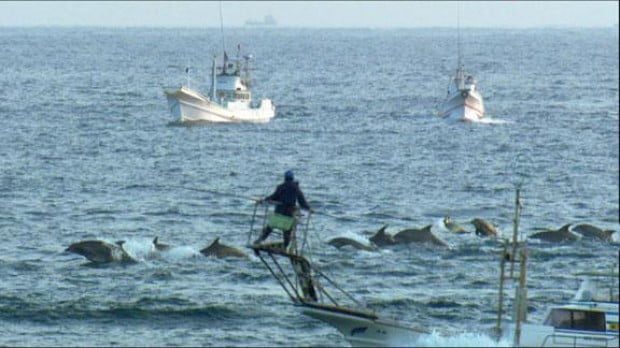
“The Cove” exposes the worldwide reality of dolphin butchery and commercial whaling, and will be shown Sept. 13 in a local screening hosted by the Malibu Film Society.
By Jonathan Friedman / Special to The Malibu Times
Those involved with the film “The Cove” do not like to refer to it as a documentary or a movie about dolphin slaughter. Instead, they prefer to call it “a real-life eco thriller and a story of redemption from the man who trained Flipper.”
“This film is not a documentary,” Malibu resident Larry David Eudene, who is working on the distribution of the movie, said in an interview last week. “It’s not like any documentary I’ve ever seen before.”
“The Cove,” which has won prizes at a number of film festivals this year including the Audience Award at Sundance, takes viewers to Taiji, Japan. Every autumn off the coast of this tiny town, according to the movie, 23,000 dolphins are killed for their meat. A number of them are also taken from the ocean and distributed to parks around the world at a price of $150,000 per head. The killing takes place at a heavily secured area surrounded by police, barbed wire and natural barriers known as “The Cove.” But as seen in the movie, a collection of activists, adventurers and film wizards defied Japanese authorities to capture the slaughter on film to expose it to the world. This included the use of undercover cameras placed in fake rocks.
The Malibu Film Society will host a screening of “The Cove” on Sept. 13 at 7 p.m. at the Malibu Jewish Center & Synagogue. Charles Hambleton, associate producer and head of the film’s undercover crew in Taiji, will speak before and after the screening, from which a portion of the proceeds will benefit the Oceanic Preservation Society.
Ironically, the man leading the fight against the dolphin killings is Ric O’Barry, who gained fame and money in the 1960s by training the five dolphins who played the role of Flipper in the television series of the same name. O’Barry blames the show for creating a multi billion dollar dolphin entertainment industry that exists at places such as Sea World. He has now dedicated his life to stopping this industry and the killing of dolphins.
“I was already starting to have a change of heart during the filming of ‘Flipper,’ but in our business we call it ‘putting the blinders on’,” O’Barry said in a press statement for this film. “I was young. I had a glamorous job. I was driving a Porsche and it was easy to do.”
O’Barry, who has been arrested numerous times throughout the world in his pursuit to rescue dolphins from death and inhumane living conditions, is currently back in Taiji with a film crew to further expose the issue.
In addition to being an undercover action thriller, “The Cove” is also a vicious attack on the Japanese government (not the Japanese people) and on the International Whaling Commission, which does not recognize dolphins as whales and therefore does not protect them as part of the international ban on whaling. The movie also alleges there is a high level of mercury poison in the dolphin meat, which is often distributed to people who do not know that is what they are eating.
“A lot of what this movie is getting out there is to get people to understand the issues and bring on a lot of international global pressure,” Hambleton said in an interview Saturday. “When it becomes not economically viable [for those involved in the dolphin slaughter and entertainment industries], which is what it boils down to, it’ll stop.”
Eudene said the longer this film stays in theaters and remains a discussion in the media, the more the issue will be exposed and the goals of those involved with “The Cove” will be achieved.
“The more that it’s in the theaters, the more of a focus there is in national and international press on this issue,” Eudene said. “And that’s what’s needed to shut these guys down.
“Japanese do not like to be embarrassed,” he continued. “And the sheer embarrassment of the entire world community through national and international press will shut this down.”
There is an attempt underway to get “The Cove” distributed in Japan, though Eudene and Hambleton claim there has been opposition. If the movie does not reach Japan, Eudene said he hopes it will at least receive major attention there if it wins the Academy Award because that is the most-watched television program of the year in Japan.
“The Cove” has received highly favorable reviews from critics. But the film has had its detractors, especially from those criticized in the movie. A Sea World spokesperson has told various media outlets how “The Cove’s” criticism is unfair because most of the dolphins at Sea World are born in captivity. To which Hambleton responds, “That is also what they used to say about slavery.
“If you look at a tank and see these are sentient beings that swim 40 miles a day, and they’re doing circles in a tank, that’s a real problem,” Hambleton said. “It’s not education…they’re in a state of controlled starvation doing stupid human tricks.”
A screening of “The Cove,” featuring commentary by Charles Hambleton, will take place Sept. 13 at Malibu Jewish Center & Synagogue, 24855 PCH, 7 p.m. Tickets are $15 in advance and $20 at the door, admission is free for Malibu Film Society members. More information can be obtained online at www.malibufilmsociety.org, at www.thecovemovie.com or by calling call 310.589.0223.
